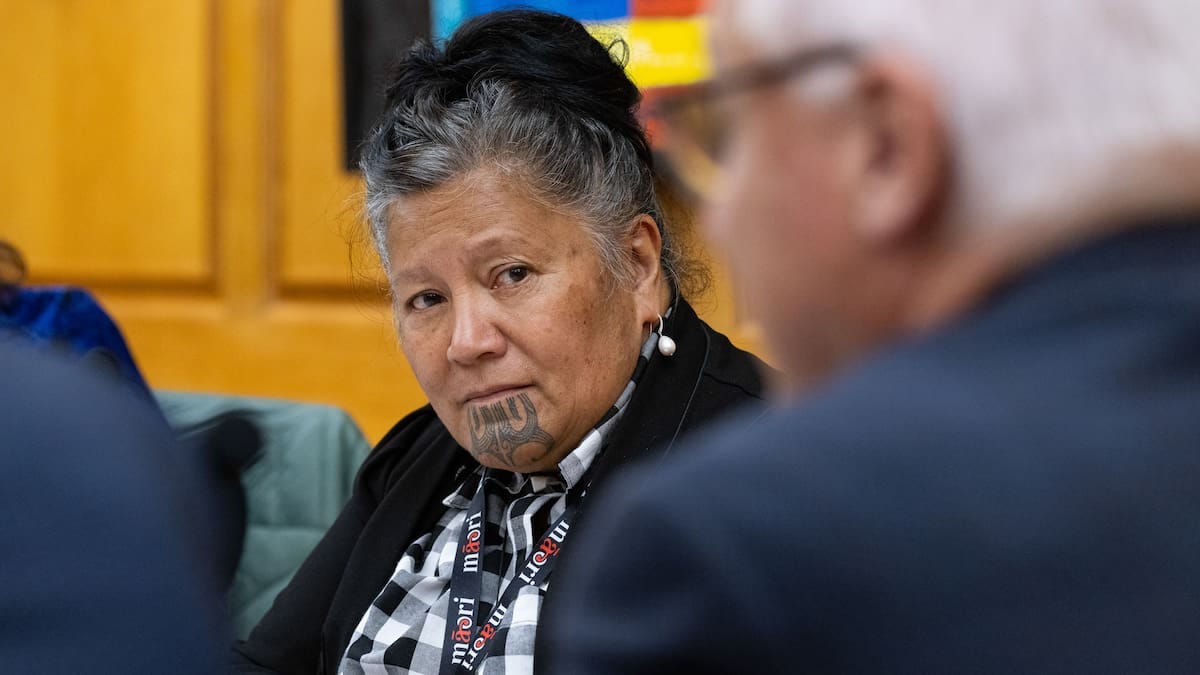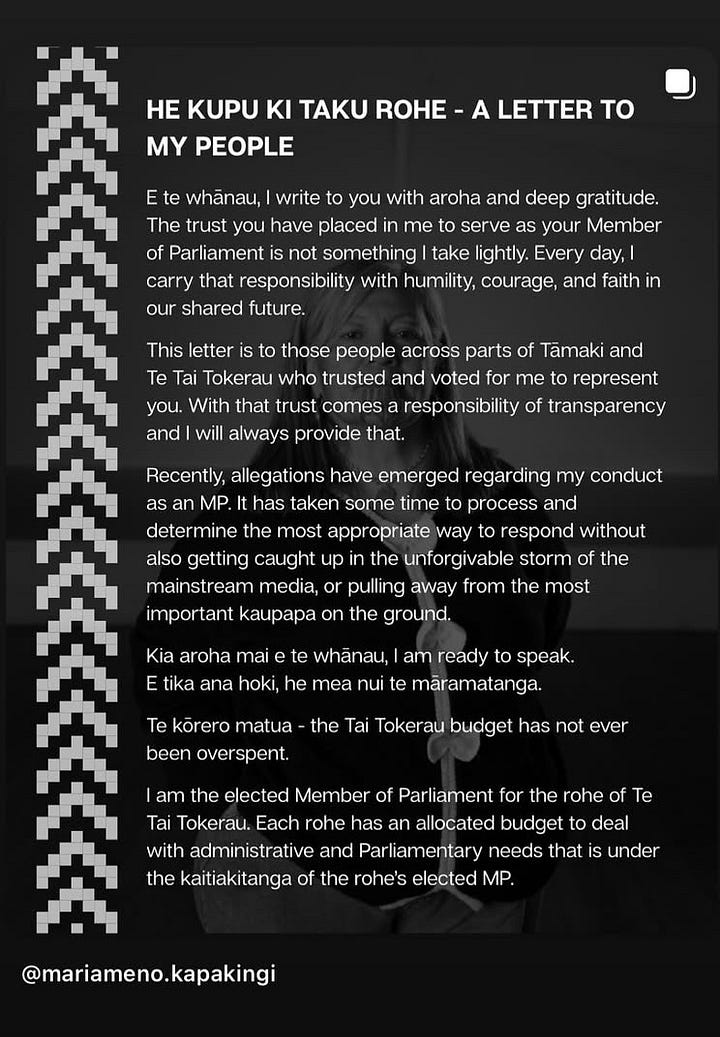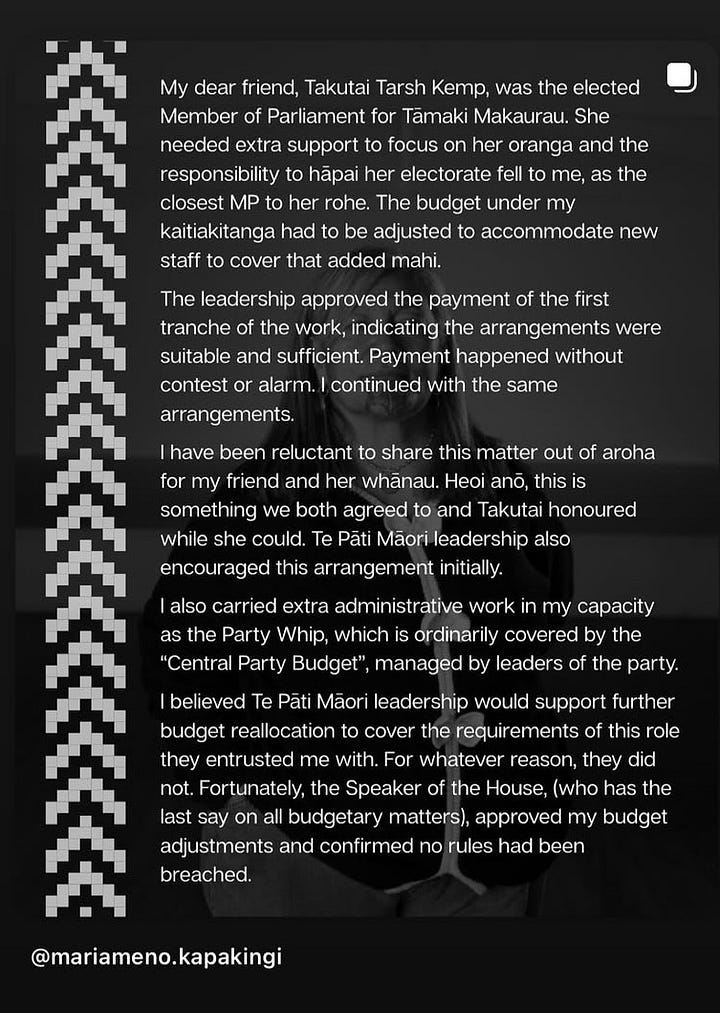Mariameno Kapa-Kingi’s Parliamentary Shame
Mariameno Kapa-Kingi’s latest statement to her constituents is an exercise in deflection, obfuscation, and sheer political theatre. She writes with “aroha” and “humility,” claiming transparency, yet carefully sidesteps the elephant in the room: her own glaring nepotism and the toxic behaviour of her racist and allegedly violent son, Eru Kapa-Kingi.

While she goes on at length about budget reallocations for a colleague, extra administrative responsibilities, and the approval of her arrangements by party leadership, she refuses to address the simple, damning truth that she paid her own son $120,000 a year to work for her as parliamentary security. Then, when his employment ended due to “serious misconduct,” she was silent. What misconduct, you ask? Well I covered that last week when he allegedly called a Parliamentary security guard a “f…en white bald head c…” and a “piece of s..t,” even threatening violence.
Not only did she put her son on the public payroll at an eye-watering sum, but she also tolerated behaviour that would make most human resources departments run screaming. Still, she has the gall to talk about transparency and trust with her electorate.
This is the problem with political theatre in Te Pāti Māori - words are sacred, but actions are conveniently ignored. Earlier this year, Kapa-Kingi herself made racist remarks by saying the white politicans were lucky to be able to live in New Zealand in the first place. Now, here she is, still in Parliament, still collecting a fat salary funded by the taxpayers who expect accountability - not excuses.
Her statement reads like a carefully rehearsed script designed to distract. She focuses on budget approvals, colleague support, and the bureaucracy of her role, but never once confronts the reality that nepotism at this scale is corruption dressed up in whānau loyalty.
Matua Kahurangi is just a bloke sharing thoughts on New Zealand and the world beyond. No fluff, just honest takes. He blogs on https://matuakahurangi.com/ where this article was sourced




1 comment:
Eru Kapa-Kingi’s response to Te Pāti Māori’s email is predictable in both form and rhetoric. As usual, he invokes “racial profiling” to excuse or contextualise the Beehive security incident, implying that no Māori should ever be questioned or challenged—even in a secure public workplace. His statement mirrors the playbook of overseas activist movements: cast the opposition as racists, downplay the behaviour, and redirect attention to systemic grievance. The mimicry is obvious, and frankly, it’s getting tiresome.
Kapa-Kingi maintains that an independent internal process cleared him of wrongdoing, framing the row as a dispute over process and leadership rather than personal misconduct. He insists his engagement with the Te Tai Tokerau office post-employment was legitimate consultancy work through Tautoru Limited—a company he co-directs with his brothers—and that payments were part-time, advisory, or speechwriting support, not “handouts” from Parliamentary budgets.
He describes the Te Pāti Māori leadership’s public email as an attempt to discredit him, claiming it demonstrates the “dictatorship-style leadership” he had previously criticised. His narrative positions himself as the whistleblower and victim of internal power games, rather than someone whose behaviour—intimidating language and threats toward security—was publicly documented.
In effect, Kapa-Kingi’s statement doubles down on two consistent lines: first, any scrutiny of him is racial profiling; second, the leadership is corrupt and authoritarian. While he apologises to young people for his own conduct, the broader strategy is to muddy the waters of accountability, highlight procedural technicalities, and shift the debate back onto party leadership.
For observers, the tension is clear: a documented incident of threatening and foul-mouthed behaviour collides with an assertive rebuttal invoking systemic bias, internal politics, and consultancy legitimacy. The wider questions—financial accountability, nepotism through Tautoru, and Parliamentary Service warnings—remain unresolved, leaving the public to parse claims and counterclaims in a haze of rhetoric and PR.
As Matua writes, the rot starts with the mother. Her son’s reply confirms it runs in the family.
— PB
Post a Comment
Thank you for joining the discussion. Breaking Views welcomes respectful contributions that enrich the debate. Please ensure your comments are not defamatory, derogatory or disruptive. We appreciate your cooperation.